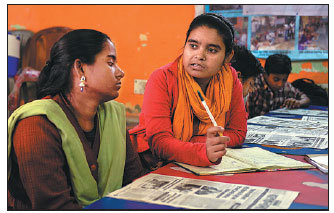Delhi's street children on the beat with hard-hitting newspaper
As one of New Delhi's thousands of street children, Jyoti Kumari knows more than most about the goings on in the Indian capital's desperate and sometimes brutal underbelly.
Now the 16-year-old, who has never stepped foot in a regular classroom, is putting her knowledge into print, reporting for a tabloid run by street kids and tackling tough issues facing the city's homeless.
At a meeting around a table strewn with drafts of stories and diaries, Kumari and other children as young as 13 are busy planning their next edition.
"We have 70 reporters now," a beaming Kumari said of her colleagues at Balaknama newspaper, meaning voice of the children in Hindi.
"We collect all the reports, verify them and then one of us types it out. After finalizing which news will go on which page, we send it for printing."
The newspaper draws its stories from the mass of families and others living under flyovers and on footpaths, and delves into issues of child marriage, sex and drug abuse and police brutality. Kumari hopes it is quietly making a difference.
"Like when the drunkard neighborhood uncle mended his ways once his misbehavior with his wife and children made it to the paper," said Kumari, giggling at the memory.
One of their biggest stories exposed how policemen used street children to carry bodies from railways tracks after a deadly accident or a suicide, forcing authorities to halt the practice.
Growing up with an alcoholic and sick father, Kumari and her five siblings spent long hours picking through rubbish to find recyclables, and sometimes begging, to scrape together enough money for food.
A chance visit in 2010 by a voluntary teacher from a nonprofit called Chetna to her family's shack on a busy roadside in south Delhi gave her hope.
"I was very impressed when she told me the value of education and the opportunities for even desperately poor children like me," said Kumari who moves, along with teems of others, to a homeless shelter at night to sleep.
Chetna, which works with Delhi's estimated 10,000 street children, enrolled her in a distance learning program run at the NGO and showed her Balaknama which the charity oversees on its premises.
She was enrolled in a journalism workshop and within weeks was heading out on reporting assignments and conducting interviews, in between her new schooling.
"We can change the way people think about us by voicing our feelings and concerns in our paper," said Shanno, the newspaper's consulting editor who uses one name. She quit her factory job of sewing hooks on trousers to work with Chetna and is now pursuing a degree in social work.
|
Eighteen-year-old Chandani, right, consults with her editor at Balaknama newspaper, during an editorial meeting in the paper's newsroom in New Delhi.Chandan Khanna / Agence France Presse |
(China Daily 04/15/2016 page12)















